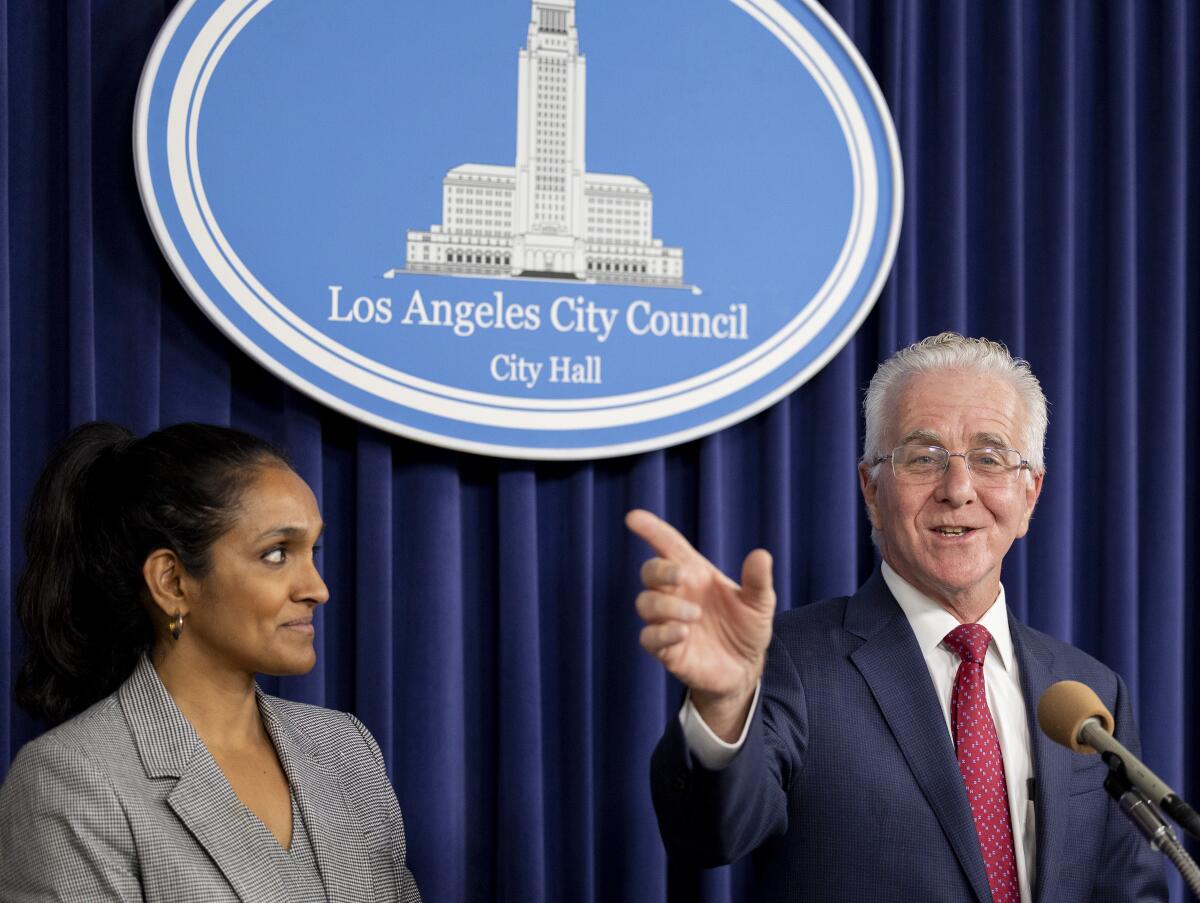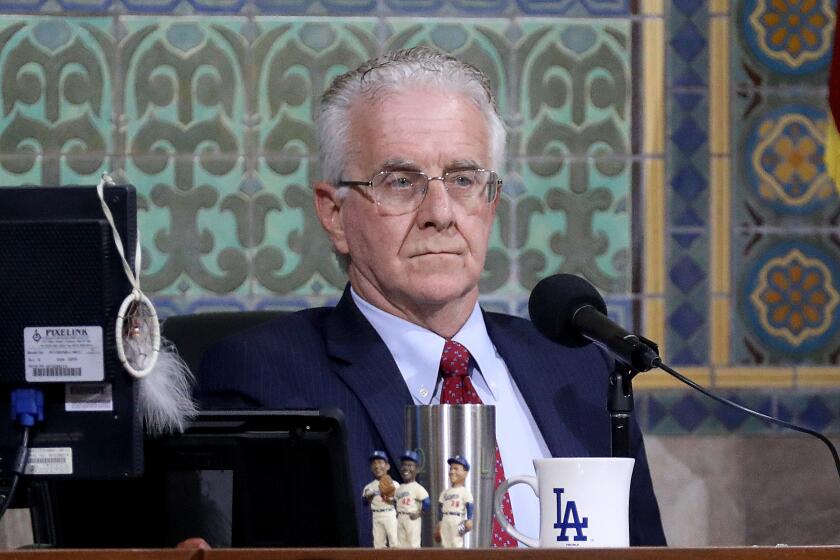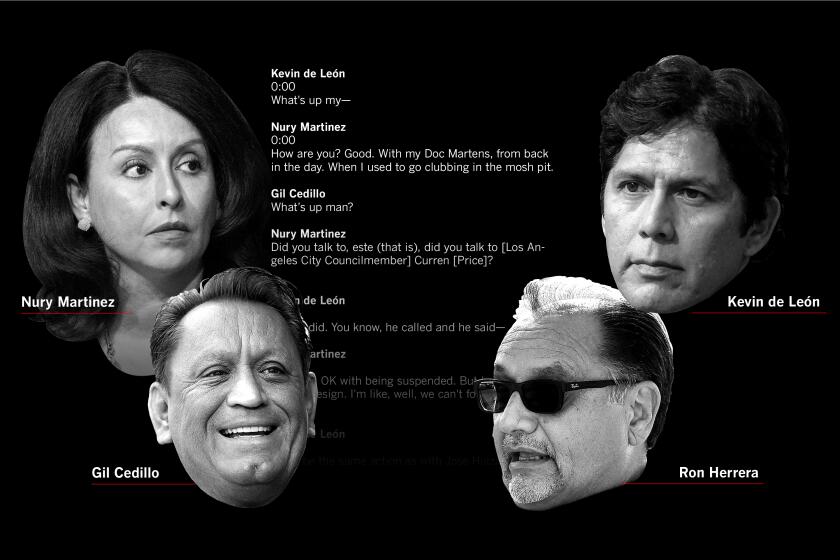L.A. will switch to independent redistricting if voters approve in 2024 election

- Share via
The Los Angeles City Council unanimously approved a plan Wednesday to establish an independent redistricting commission for the city and place it on the November 2024 ballot.
The council’s action caps a years-long effort to fix a process that has been widely decried as broken.
Under the city’s current redistricting system, the City Council has the final say over the maps, which are redrawn every 10 years, and elected officials can appoint members to the redistricting panel who essentially act as their proxies. Implementing independent redistricting would curtail the council’s influence over their own district lines.
The council’s reform committee endorsed a detailed plan to take redistricting out of the hands of the council. But they postponed action on council expansion once again.
If approved by Los Angeles voters, the new independent redistricting commission would be composed of 16 commissioners and four alternates who serve 10-year terms. The application process will be managed by the city clerk’s office, with the City Ethics Commission providing oversight. After completing their service, commissioners will be ineligible to run for any council district seat whose boundaries they helped draw, among other restrictions.
“The city of Los Angeles is building on the best practices from around the state and the country and really, I think, setting a gold standard for everybody to be looking for,” said Kathay Feng, national redistricting director for the nonpartisan government accountability watchdog group Common Cause. Feng previously helped lead the effort to institute independent redistricting on the state level.
The city proposal was created and exhaustively deliberated by the council’s high-profile government reform committee, which convened in the wake of last year’s City Hall audio leak scandal to advance reforms and restore faith in the scandal-plagued institution.
The reform committee is expected to take up a more contentious proposal to increase the size of the 15-member City Council during a meeting Thursday. Increasing the council’s size would also be subject to a public vote, since it would require changes to the City Charter, as is the case for independent redistricting.
“A little over a year ago, this city was rocked by the revelation of a recorded conversation involving four leaders of our city, who made shocking and deeply disturbing comments that caused the entire nation to be to be stunned and frankly disgusted,” Council President Paul Krekorian said during a news conference prior to the vote. “And it’s important that we remember that as shocking as the words were that took place in that meeting, the subject matter of that meeting was redistricting.”
Krekorian, who heads the reform committee, called the secretly recorded leaked 2021 conversation “the direct result of the broken redistricting program that we have under our City Charter right now.”
During the recorded conversation, three council members and a union leader — Ron Herrera, then head of the powerful Los Angeles County Federation of Labor — discussed ways of drawing district maps that would benefit either themselves or their political allies.
They spoke about chopping up Councilmember Nithya Raman’s district, with one council member — Kevin De León — saying it should be put in a “blender.” Racist or derogatory remarks about Black people, indigenous Oaxacan residents and others were also made.
A bombshell recording has thrown L.A. politics into chaos. What was really being discussed? L.A. Times reporters and columnists pick it apart, line by line.
Herrera and then-Council President Nury Martinez resigned in the wake of the scandal. Councilmember Gil Cedillo, who had already lost his bid for reelection, finished out his term. De León is running for reelection in March.
Krekorian described the city’s current redistricting system as “the worst of all worlds.” The council retains control of the process, while the public is provided “with a fig leaf of supposedly independent redistricting” since the council members are not drawing the lines themselves, he said. Yet they can influence the process and have final say over it.
(Council members drew their own district lines for much of the last century. The current quasi-independent system of appointed commissioners was the result of City Charter changes approved by voters in 1999.)
If approved, the new process “will really give people the opportunity to have confidence and faith that the way the district lines are drawn” is only intended to serve the public good and not the interests of elected officials, Krekorian said.
Raman and Krekorian first pushed an independent redistricting proposal in December 2021. But that effort stalled out under Martinez’s leadership. It didn’t move forward until after the leaked conversation emerged in October 2022 — an incendiary event that created widespread momentum for City Hall reform efforts.
“It was only after they came out that we were able to really begin the process of getting into designing what that new system would be like for the city of Los Angeles. ... It has taken a long time, it has been a hard-won fight,” Raman said.
More to Read
Sign up for Essential California
The most important California stories and recommendations in your inbox every morning.
You may occasionally receive promotional content from the Los Angeles Times.
















